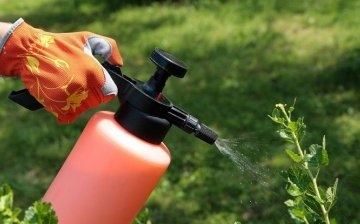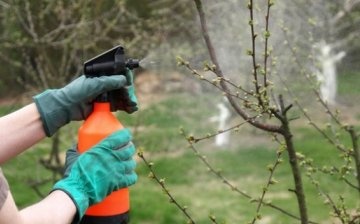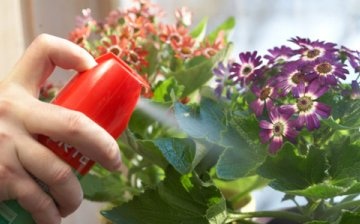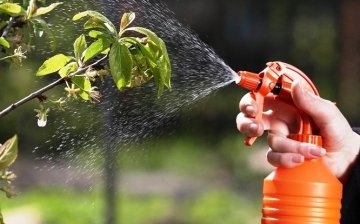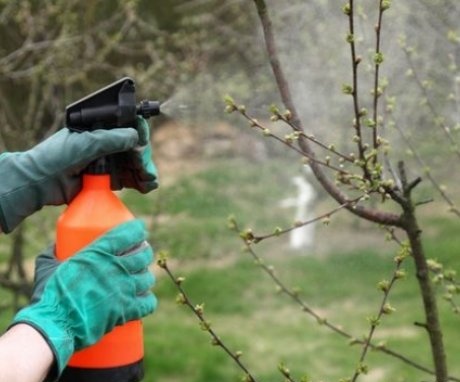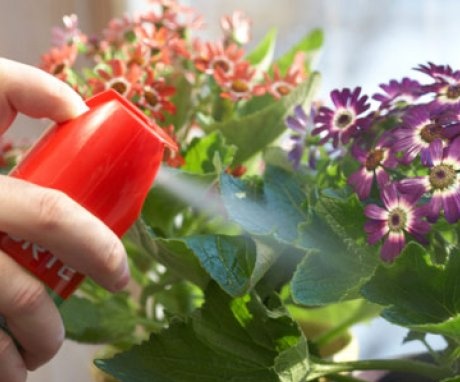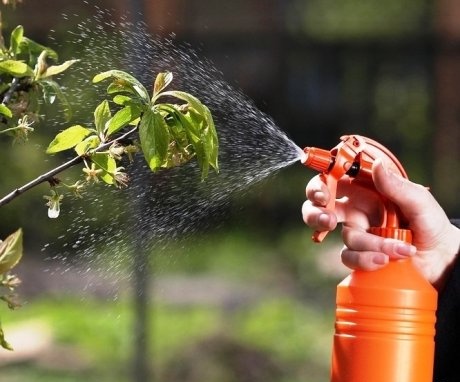No pests: advice to gardeners and flower growers
A rare gardener has not encountered various diseases and pests plants. Someone prefers to cope with them exclusively with folk and natural remedies, while someone relies on the effectiveness of modern drugs. Any pesticide must be used in a certain dosage and wisely in order to achieve the best result. For example, everyone needs to spray potatoes from the Colorado potato beetle. Otherwise, after the rain, the drug will wash off, and the beetles will fly back from the neighboring gardens.
Content:
Preparations and folk remedies for garden pests
Pests reduce the quantity and quality of the harvest, lead to the death of plants, so it is important to say no to pests, but it is better to take preventive measures that will significantly reduce the likelihood of insects.
Fruit trees that remain overwinter should be processed in the spring before flowering. For them, special pesticides are used that destroy pests that can survive the winter. However, these drugs can burn greens, so the perfect time processing - early spring before swelling of the kidneys. These drugs include Nitrafen paste. It is used against aphids, ticks, scale insects, copperheads. The paste should be diluted in 10 liters of water, being careful not to stain walls and clothes. Spray the plant with the solution.
Iron vitriol is one of the low-poisonous preparations for pest control of the garden. It is sold as a soluble powder. Most often it is used to combat lichens.
Fruit and berry trees can also be processed during the period of active growth.
For these purposes, the drug Chlorophos is suitable. This chemical actively fights against caterpillars, sawflies, flies. It must be diluted in water, and the plants must be treated. The drug is flammable.
Among the folk remedies, the following are the most popular:
- A decoction of potato tops. This broth has long been used to combat ticks and aphids. The tops should be fresh, not dried. It is poured with 10 liters of water and left for 4 hours, then filtered. The broth is not stored, it is used fresh immediately after preparation.
- A decoction of tomato tops. The tops should be poured with plenty of water and boiled for half an hour. Then let it brew, strain, dilute with water in a ratio of 1: 3, add a small amount of shavings of laundry soap. Apply against caterpillars and aphids.
- Garlic is very effective in the fight against spider mites, aphids, raspberry fly. Garlic need to be cut into small pieces, pour water in a 1: 1 ratio. Cover with a lid, put in a glass container for 9 days. You will get a concentrate. For 10 liters of water, 20 g of such an infusion will be enough. Spraying must be repeated after a week.
Pest control of indoor plants
Indoor plants are attacked just as often as garden crops. In this matter, prevention is important, correct care, selection of drugs, then the fight against pests of indoor plants will be crowned with success.
There are many methods for controlling insects that damage potted flowers:
- Mechanical means. Indoor plants should be regularly inspected for signs of rot, larvae, flies, damage.In the early stages, mechanical stimulation can be very effective. It consists in removing the larvae, processing plants with a warm shower.
- Strengthening with silicic acid. This remedy is prophylactic. Silicic acid strengthens plant tissues, increases disease resistance and pests.
- Insecticides. This is the name of insect control agents. The choice of these drugs is very wide. You can find broad-spectrum pesticides that will kill all insects and their larvae, or targeted pesticides designed to control a specific pest. These drugs are poisonous to people and pets, they must be used carefully and use protective equipment, masks, gloves. An example is the drug Phosbecid. This drug fights many insects. They are advised to process the leaves and moisten the soil.
- Fungicides. These drugs fight fungi and bacteria that cause various diseases. Sometimes treatment with both insecticides and fungicides is required.
Among the specific drugs that are popular among lovers of indoor plants are Bazudin, Grom-2, Aktara, Neoron. Aktara is very effective against a wide variety of insects: aphids, beetles, leafhoppers, whiteflies, flea beetles, moths, etc. This drug is also used in vegetable gardens to protect shrubs and trees. It works for a long time, is not washed off by water or precipitation, protects plants and soil.
Indoor plants are recommended to be sprayed with the drug at the rate of 4 g per 5 liters of water.
Folk remedies for pest control of potted flowers are also popular. For example, to this day, a universal remedy is onion... It is finely cut along with the husk and soaked in water for 7 hours, then the plants are sprayed.
Woodlice are often found in houses with high humidity. They can damage indoor plants. They are recommended to be removed by hand or to put boxes of damp cardboard. Woodlice will crawl there. It is much easier to throw away the cardboard, there is to look for wood lice in the ground.
Precautions
Any chemical preparations intended for the destruction of pests contain poison to one degree or another. The hazard class is always indicated on the package or in the instructions, where 4 is the least dangerous, and 1 is the most dangerous. Class 3 drugs are usually sold in stores.
Pesticides require strict adherence to safety rules:
- Before use, be sure to read the instructions. It is advisable to read it in full, find the expiration date, hazard class, method of application, possible reactions of the body, recommendations for storing the drug.
- Even those products that say "safe for humans and animals" must be used with caution. The drug must not be inhaled or in contact with the skin or eyes. Indoor plants are better spray on the street or on the balcony... You can not dilute the chemical in the kitchen next to food, drinking water. Keep pesticides out of the reach of children and pets.
- There is never enough protection. It is recommended to use a respirator or mask, gauze bandage, strong rubber gloves, an apron, and special clothing. Clothes can be ordinary, but immediately after spraying, they must be removed, and it is better to throw them away.
- After spraying, you need to wash yourself with soap, wash your hands, even if you had gloves and a mask. The clothes must be changed. If the package of the drug does not close tightly, it must be wrapped in an additional bag or put in a tightly closed box.
- Pesticides should be stored in a cool place at a temperature of no more than 30 degrees, protected from heat, moisture and sunlight, and not stored next to food utensils.
- You should never use utensils that are designed for cooking. There must be a separate container for the dilution of chemicals.
- Do not touch your face while diluting the drug or spraying.Eat, drink, smoke only after finishing work and washing with soap.
- If, nevertheless, the drug gets on the skin or eyes, it is necessary to rinse the affected area with plenty of water. If you experience a burning sensation or rash, see a doctor.
All chemicals contain toxic substances that must be used judiciously and carefully. Struggling with pests, negative consequences for people and plants should not be allowed.
More information can be found in the video.



